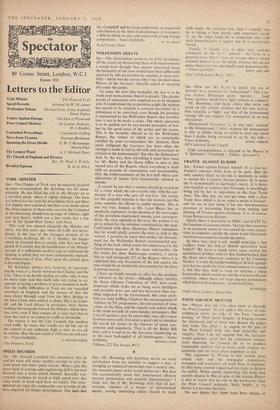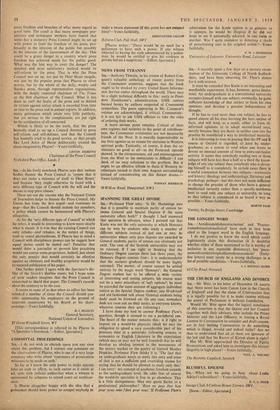PRESS COUNCIL MOINES SIR.—Pharos does his best once more to
discredit the Press Council. He has used a fine array of con- temptuous terms. He talks of 'the Press Council's prating,' of 'Fleet Street Moguls.' of fl'nging around the whitewash and of those who despise the judges they bribe. The effect ii to suggest on the part of the Press Council little less than hypocrisy and venality. Now I do not suppose that the Spectator would seriously claim that the constituent associa- tions, financing the Council do so to produce favourable verdicts. Let us leave aside abusive ex- pressions and sec what plain argument is left.
The argument by Pharos is that certain press . abuses exist and the newspaper proprietors, managers and journalists all want these to continue. So they have created a quasi-jud'cial body to deceive the public. While openly supporting, this body they secretly despise it. But in spite of the secrecy Pharos is able to reveal that no one in the profession takes the Press Council seriously. Such, briefly, is his theory. Let me state the facts.
No one denies that there have been abuses of
press freedom and breaches of what many regard as good taste. The result is that many newspaper pro- prietors and newspaper workers have feared that some day a statutory Press Council might be set up with power to limit the freedom of the press, pro- fessedly in the interests of the public but possibly in the interests of the Government of the day. This could be a grave danger in a country where press freedom has achieved much for the public good. What was the best way to avert the danger? The simplest and most satisfactory method would oe self-reform by the press. That is why the Press Council was set up, not just by Fleet Street moguls, not just by the popular press that Pharos so often scorns, but by the whole of the daily, weekly and Sunday press, through representative organisations, with the deeply respected chairman of The Times as the first chairman of the Council. What it has done to curb the faults of the press and to defend its virtues against unfair attack is recorded from time to time in the press and in annual reports. In addition, many grievances which attain very little publicity, but are serious to the complainants, are put right to the satisfaction of all concerned.
Which is likely to be the truth, that the press honestly tried to set up a Council devoted to press self-reform and self-defence, and that the Council has honestly tried to do good service, or that people like Lord Astor of Hever deliberately created the sham imagined by Pharos?—Yours faithfully,
LINTON ANDREWS
Chairman of the Press Council Yorkshire Post Office, Leeds, 1











































 Previous page
Previous page